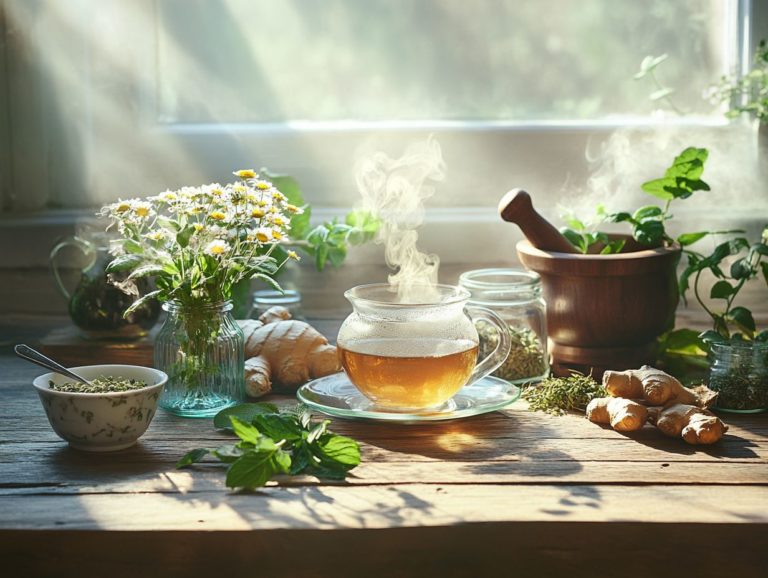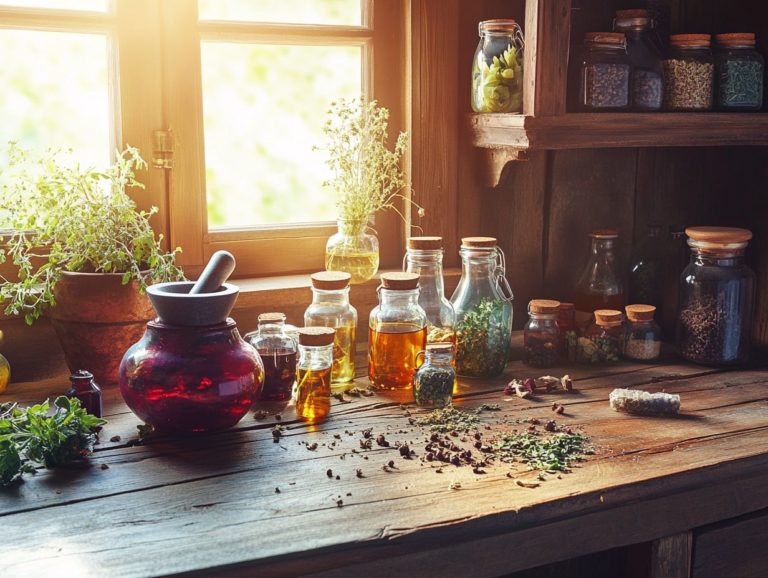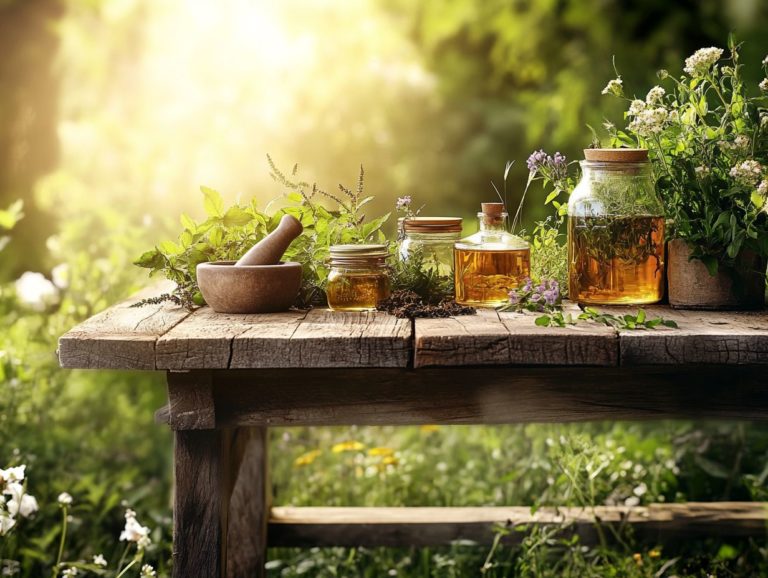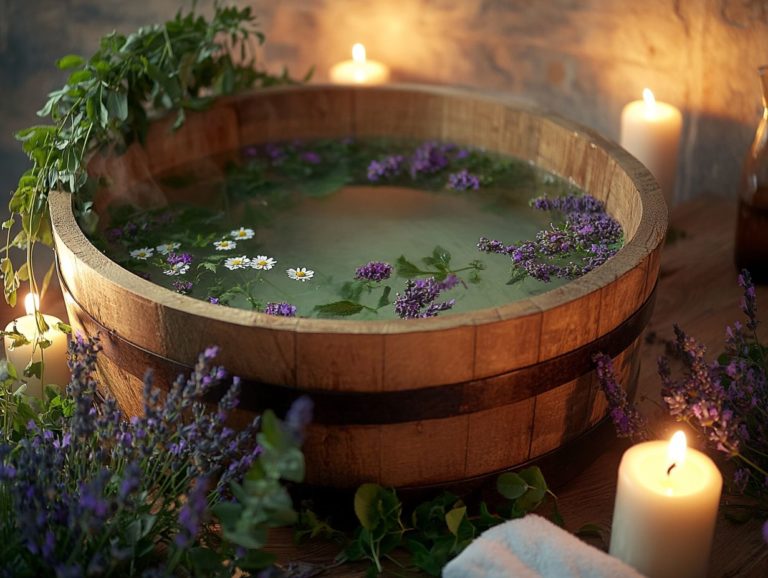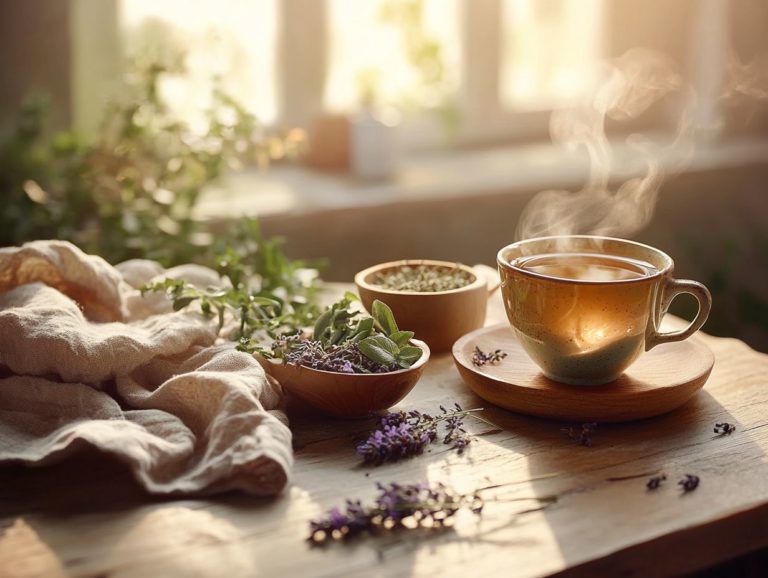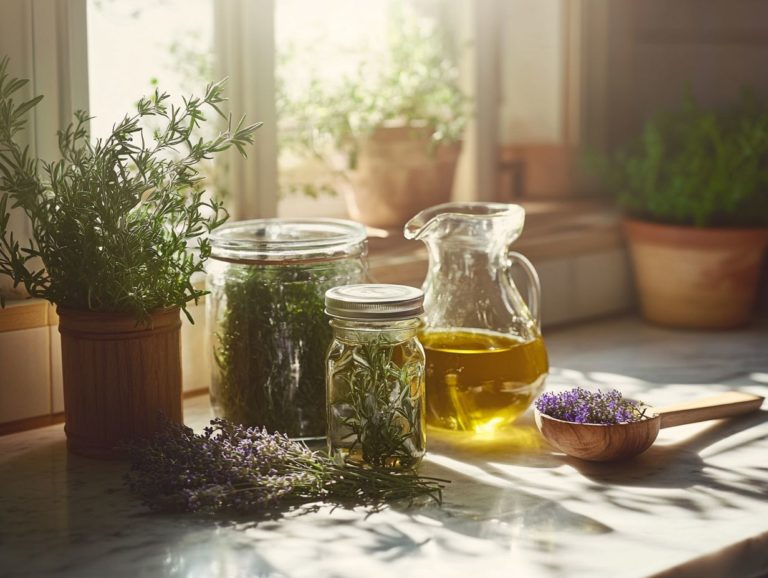Crafting Your Own Herbal Remedies at Home
Have you ever thought about making your own herbal remedies? It’s a fun and fulfilling way to take charge of your health!
Herbal remedies have been cherished for centuries as natural solutions for wellness. You can craft your own recipes right at home, tailored to your specific needs.
Learn about the essential tools and ingredients needed, along with preparation methods like infusions and tinctures. Tinctures are concentrated herbal extracts made by soaking herbs in alcohol or vinegar.
We will cover safety considerations to ensure you navigate this world confidently. Explore popular recipes for common ailments, and unlock the healing power of herbs to elevate your self-care routine.
Contents
- Key Takeaways:
- Benefits of Crafting Your Own Remedies
- Essential Tools and Ingredients
- Common Herbs and Their Uses
- Methods of Preparation
- Safety Considerations
- Popular Herbal Remedies to Make at Home
- Frequently Asked Questions
- Can I really make my own herbal remedies at home?
- What are the benefits of crafting my own herbal remedies at home?
- What ingredients do I need for crafting my own herbal remedies at home?
- Do I need any special tools for crafting my own herbal remedies at home?
- Are there any safety precautions I should take when crafting my own herbal remedies at home?
- Where can I find reliable information and resources for crafting my own herbal remedies at home?
Key Takeaways:
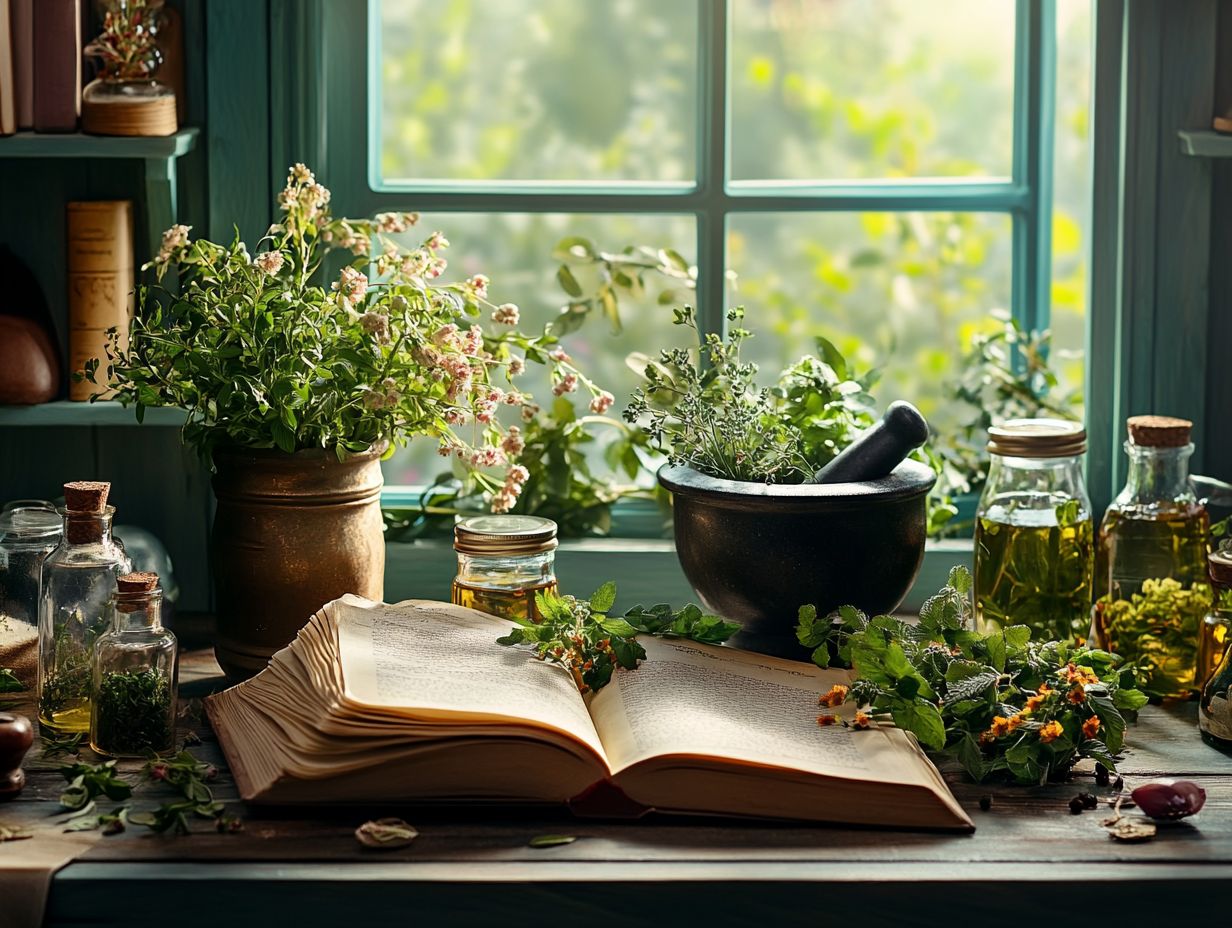
What are Herbal Remedies?
Herbal remedies invite you into a world of natural treatments. They draw from the rich healing properties of herbs, offering alternatives to conventional medicine.
These remedies have been used for centuries in many cultures. They include everything from infusions and tinctures to topical applications.
By crafting your own herbal creations, you can harness the power of nature to address ailments like skin conditions, colds, and digestive issues.
The fascinating history of herbal remedies stretches back to ancient civilizations. Plants like garlic and ginger were celebrated for their healing properties.
Chamomile, often brewed into tea, is known for its calming effects, helping with sleep and digestion. Aloe vera gel soothes sunburns and promotes skin healing when applied topically.
Herbal tinctures provide a concentrated form of herbal medicine that’s easy to consume. This variety of preparation methods allows you to customize remedies to suit your unique needs.
Benefits of Crafting Your Own Remedies
Making your own herbal remedies brings a deep sense of satisfaction. You’ll enjoy cost savings and the customization it offers for your health needs.
By developing your own recipes, you save money on store-bought products and know exactly what goes into your remedies. This hands-on approach fosters a deeper connection with the benefits of herbs.
Your home apothecary opens the door to explore the diverse world of natural remedies. This journey ultimately enhances your self-sufficiency.
Start crafting your herbal remedies today and take the first step towards better health!
Cost-Effectiveness and Customization
One of the standout benefits of crafting your own herbal remedies is the remarkable cost-effectiveness, especially when utilizing ingredients like beeswax and olive oil. Homemade herbal formulations typically come in much cheaper than their store-bought counterparts, and they offer the luxury of complete customization.
By sourcing your ingredients, whether they’re fresh herbs from your garden or high-quality herbal recipes, you can create remedies that cater precisely to your needs, ensuring both efficacy and safety. For pet owners, knowing how to create herbal remedies for pets is invaluable. This level of customization not only empowers you to take control of your health but also champions sustainable practices by reducing your reliance on commercial products.
When you delve into the financial aspect, the savings become strikingly clear: a store-bought herbal tincture could set you back $20 or more, while making your own can cost as little as $5 if you grow your herbs. Foraging for common plants can drive that cost down to mere cents.
Plus, the flexibility to modify recipes based on your personal preferences means you can enhance or adjust your formula to address specific health concerns like allergies or seasonal ailments without spending extra.
This hands-on approach nurtures a deeper understanding of herbal medicine, encouraging you to explore what truly works best for your unique needs.
Essential Tools and Ingredients
To successfully create your own herbal recipes and remedies, it s essential to have the right tools and ingredients at your disposal, as they form the backbone of your herbal kit.
Gathering a selection of essential tools is crucial. You ll want items like a sturdy mortar and pestle, jars for proper storage, and a pot setup for gentle heating for crafting preparations made by soaking herbs in oil or water.
Having a selection of healing herbs such as lavender, ginger, and calendula will empower you to craft a variety of homemade remedies tailored to different conditions. For those interested in making your own products, infusing oils with herbs can be a rewarding process. Ensuring you have high-quality base ingredients like beeswax for salves and olive oil for infusions is crucial for effective preparation.
Must-Have Supplies for Crafting
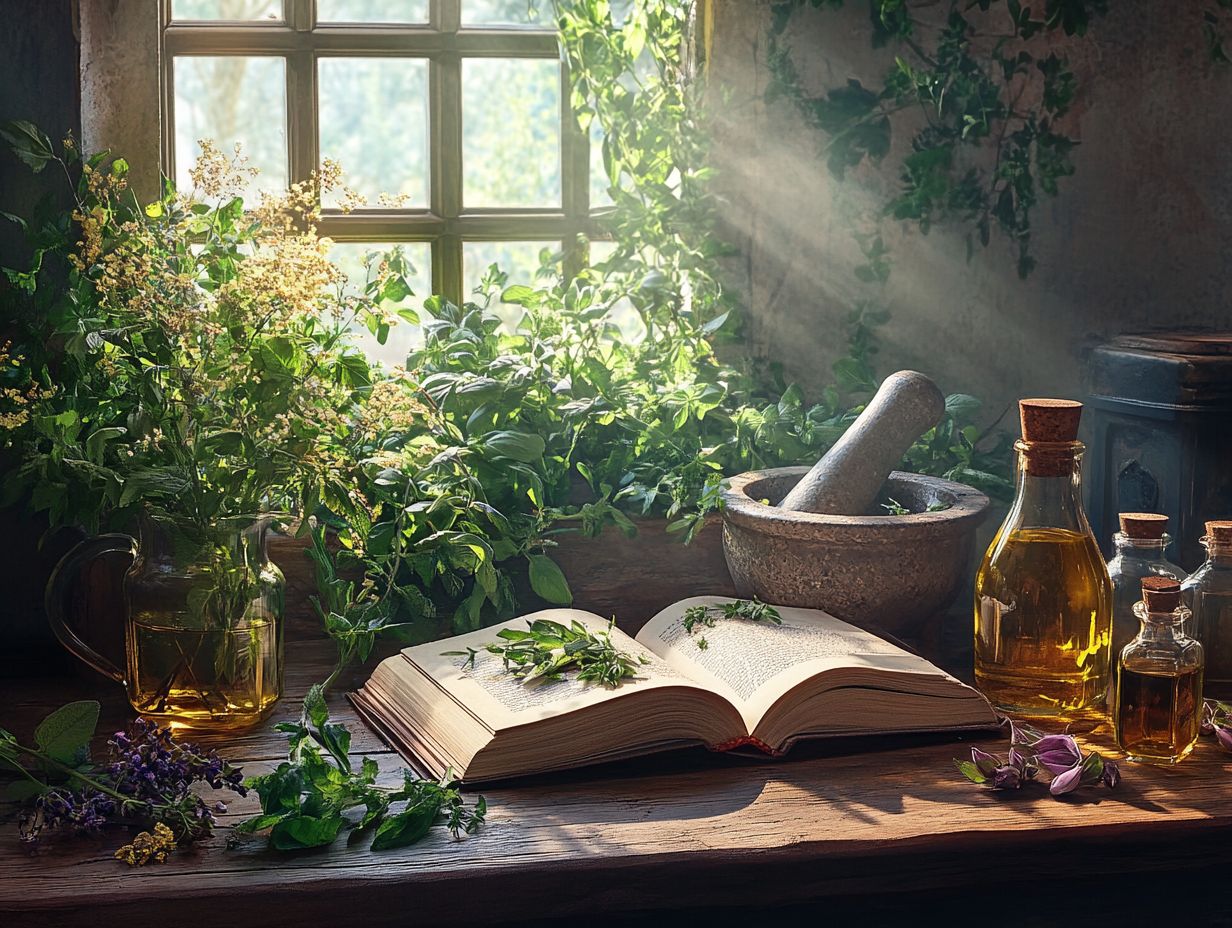
An essential herbal kit should include must-have supplies that enable you to craft your own homemade herbal remedies, ensuring you have everything necessary to create effective herbal infusions and other preparations. Key supplies you ll want are glass jars for storage, a fine mesh strainer for infusions, and a glass dropper for tinctures these tools collectively empower you to prepare your remedies with precision and effectiveness.
Adding items like labels for organization and a notebook for tracking your recipes can significantly enhance your herbal crafting experience, making it easier to replicate those successful concoctions.
Build an amazing herbal kit that makes crafting remedies a breeze! Consider categorizing your tools into:
- A mortar and pestle for grinding dried herbs,
- Essential measuring spoons for precise dosages,
- A scale for accurate weight measurements.
For sourcing, local health food stores, herbal shops, and online retailers are excellent places to find high-quality ingredients and tools. To keep everything tidy, designate specific drawers or containers for each category. This way, you can quickly access what you need, saving time and minimizing frustration during your herbal adventures.
Don’t wait! Start gathering your supplies today to create effective herbal remedies!
Common Herbs and Their Uses
Understanding common herbs and their uses is essential for anyone diving into the world of herbal remedies. These healing herbs provide a wealth of benefits for various health issues.
Take elderberry syrup, for instance; it s widely acclaimed for its effectiveness against colds and flu. Similarly, herbs like ginger and lavender can offer digestive support and relaxation, respectively.
By familiarizing yourself with these versatile plants, you can create effective home remedies tailored to your unique needs, transforming everyday herbs into powerful allies for your well-being.
Incorporating turmeric into your meals not only elevates flavor but also acts as a robust anti-inflammatory, promoting joint health. Don t overlook mint this often-underappreciated herb can soothe digestive discomfort and freshen your breath, making it a fantastic addition to teas or salads.
Each of these herbs can be steeped, infused, or incorporated into cooking, allowing them to blend effortlessly into your daily routine.
Whether you re crafting soothing teas, aromatic oils, or culinary delights, these herbs can boost your health and vitality, empowering you to take charge of your wellness naturally.
Methods of Preparation
The methods for preparing herbal remedies are varied, with techniques like infusions, decoctions, and tinctures, each tailored for specific herbal recipes.
Infusions are your go-to for delicate herbs; you simply steep the plant material in hot water to draw out essential compounds. For tougher materials like roots and bark, decoctions involve boiling the herbs, usually for 20 to 30 minutes, to extract their benefits.
Tinctures are concentrated herbal solutions made by soaking herbs in alcohol or vinegar. This method preserves the medicinal properties of herbs, resulting in a potent form of herbal medicine.
Master these methods today, and unlock your potential to create amazing herbal remedies!
Infusions, Decoctions, and Tinctures
Infusions, decoctions, and tinctures are three essential methods of preparation in herbal medicine, each bringing its own unique benefits for your homemade remedies.
When you prepare an infusion, it s crucial to use fresh or dried herbs and let them steep for 5 to 15 minutes, depending on how potent the herb is. Think chamomile for a soothing relaxation boost or peppermint to aid your digestion.
On the other hand, decoctions require boiling the herbs for 20 to 30 minutes to draw out the full spectrum of flavors and compounds. This method works wonders for roots like ginger and burdock.
Tinctures call for a longer commitment typically 4 to 6 weeks where you immerse the herbs in high-proof alcohol. This technique is perfect for potent herbs like echinacea or valerian root, ensuring a strong, shelf-stable remedy.
Each method has its advantages: infusions are swift and simple, decoctions offer rich depth, and tinctures provide long-lasting preservation. Yet, it s important to keep in mind the limitations as well, such as the time investment for tinctures and the need for precise measurements to guarantee effectiveness.
Safety Considerations
When you immerse yourself in the realm of herbal medicine, prioritizing safety considerations is essential for both effectiveness and security in your use of herbal remedies.
Gaining a clear understanding of potential interactions between herbs and medications, along with mastering the appropriate dosages, can be pivotal in preventing any adverse effects.
Safe storage of homemade herbal products is crucial for preserving their potency and efficacy over time. By adhering to established guidelines and best practices, you can fully harness the healing power of herbs while minimizing any associated risks.
Try incorporating these herbs into your life, and experience the transformative power of herbal remedies!
Guidelines for Safe Usage and Storage
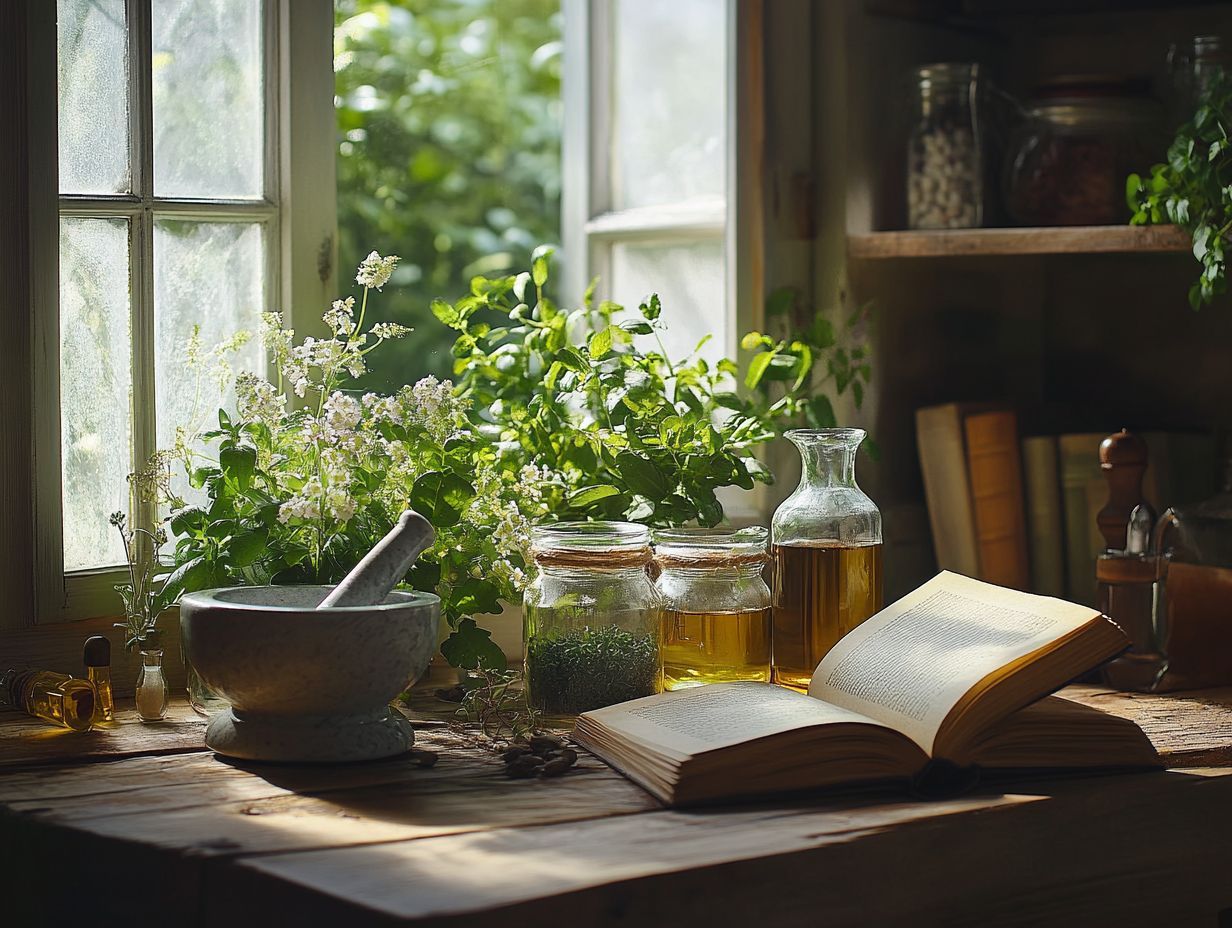
Guidelines for the safe usage and storage of herbal remedies are essential for anyone looking to fully enjoy the benefits of herbal medicine. This ensures both efficacy and safety in your personal apothecary. Be sure to label all your homemade herbal products clearly, including the ingredients, preparation date, and expiration date. This simple step helps prevent confusion and misuse.
Store tinctures and oils in dark glass bottles. Keep them in a cool, dry place. This not only prolongs their shelf life but also preserves their potency. It’s vital to consume infusions within a reasonable timeframe to maintain their quality and effectiveness.
Using proper storage practices, such as airtight containers for dried herbs and shielding them from direct sunlight, supports the preservation of their beneficial properties. Regularly check your preparations for signs of spoilage, like off odors or changes in color, to ensure a remedy is still safe for use.
Following these practices enhances the effectiveness of your herbal products while safeguarding your health. This highlights the importance of diligence and awareness in the art of herbal crafting.
Popular Herbal Remedies to Make at Home
Crafting popular herbal remedies at home can be a truly rewarding journey, especially when you have access to effective recipes like elderberry syrup, renowned for its immune-boosting properties.
Diving into various herbal recipes allows you to create remedies that tackle common ailments, from seasonal colds to skin conditions. Homemade herbal preparations not only enable you to personalize your approach but also promote a more sustainable way of nurturing your health and wellness. This fosters a deeper connection with nature.
As you explore these remedies, you’ll uncover valuable insights into the remarkable versatility and efficacy of plants.
Recipes and Instructions for Common Ailments
Crafting herbal recipes tailored to common ailments can elevate your wellness routine, providing effective remedies like elderberry syrup for colds and herbal teas for digestive issues. Each recipe uses specific herbs known for their healing properties and includes straightforward instructions for easy preparation at home.
Whether you re facing skin conditions, digestive discomfort, or respiratory issues, having a collection of effective herbal remedies gives you the power to address these concerns naturally and confidently.
These preparations harness nature s bounty and enable you to take charge of your health. For example, chamomile tea can calm anxious minds, while turmeric is a powerful ally in reducing inflammation making these herbs practical choices for daily wellness.
Preparing herbal tinctures or infusions is usually quite simple, requiring minimal ingredients and equipment. Recommendations typically outline safe and effective dosages, ensuring both potency and ease of use.
By incorporating these remedies, you can foster a holistic approach to health that promotes a balanced lifestyle and longevity.
Frequently Asked Questions
Can I really make my own herbal remedies at home?
Yes, absolutely! With the right ingredients, tools, and knowledge, anyone can create their own herbal remedies at home.
What are the benefits of crafting my own herbal remedies at home?
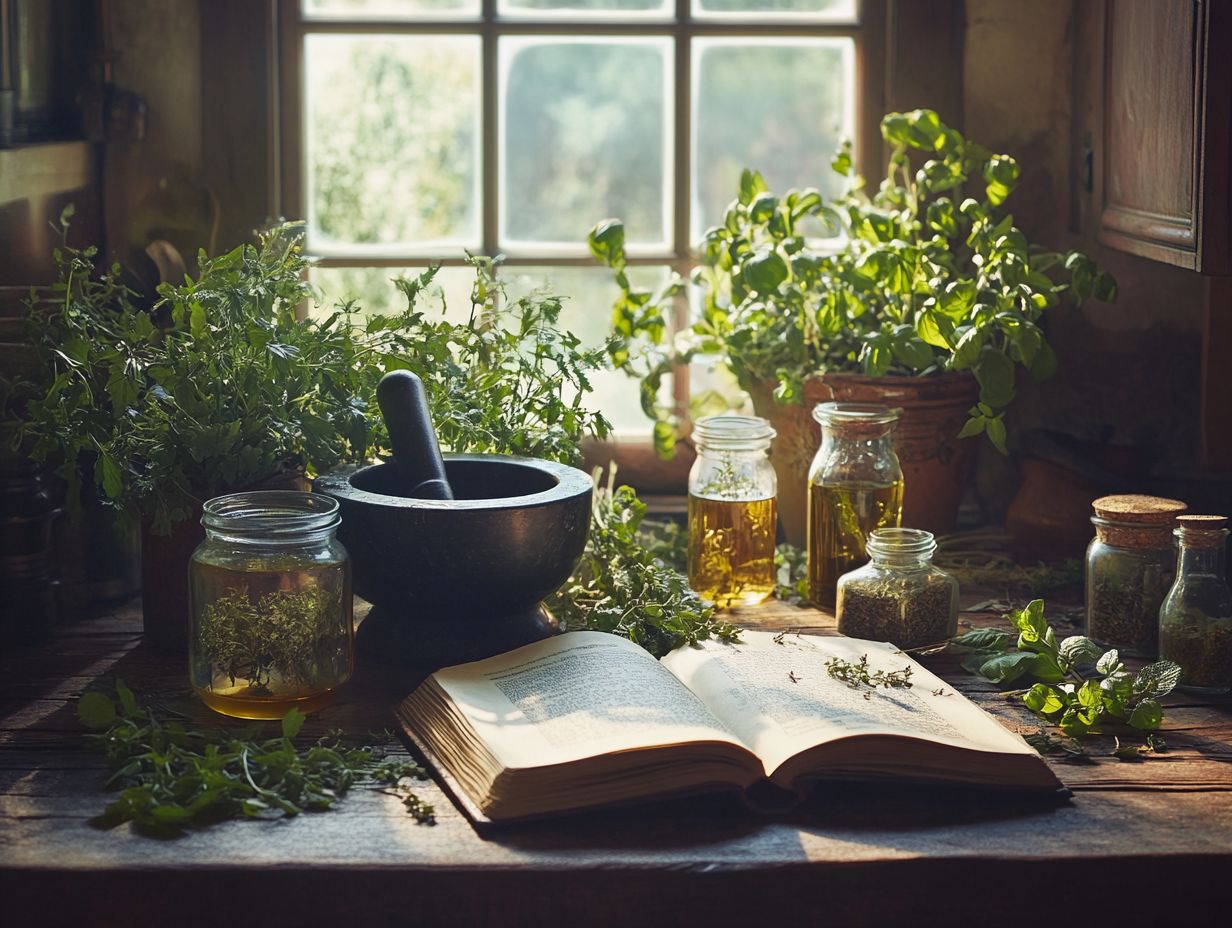
Crafting your own herbal remedies at home allows you to control the ingredients used, ensuring purity and avoiding harmful chemicals or additives. It can save you money and provide a sense of satisfaction and self-sufficiency, enhancing your health with a personal touch.
What ingredients do I need for crafting my own herbal remedies at home?
You can use a variety of fresh or dried herbs, such as ginger, peppermint, chamomile, or lavender, as well as oils, honey, and other natural ingredients. It’s important to research the specific herbs and their properties before using them in a remedy.
Do I need any special tools for crafting my own herbal remedies at home?
You can use basic kitchen tools like a pot, stove, and measuring spoons. Some remedies may require a tool for crushing herbs, but specific tools can simplify the process.
Are there any safety precautions I should take when crafting my own herbal remedies at home?
Yes, it’s vital to follow basic safety rules when handling herbs. Always use gloves and masks if needed, label your ingredients clearly, and be aware of any allergies.
Where can I find reliable information and resources for crafting my own herbal remedies at home?
There are many great books, websites, and workshops that offer valuable guidance. Dive into exciting resources to learn more and consult with experts to ensure safe use of herbs.

